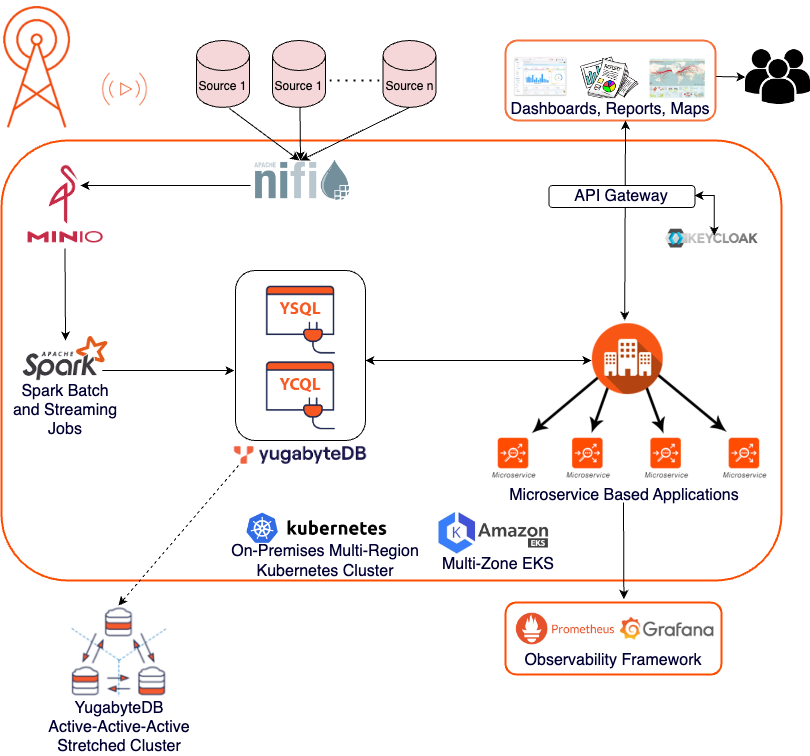Unlocking the Benefits of a Cloud Native Architecture for the Telcom Industry
The telecommunications industry is currently undergoing a digital revolution, driven by increased connectivity, data volume, and the rising demand for real-time services.
In this transformative landscape, modernizing data management and architecture is essential. Telecom companies’ operators and vendors need a strong, resilient, and scalable database solution. It must support modernization efforts, enable microservice-based architectures for optimized operations, scalable growth, improved customer experiences, meeting demands, and fostering innovation.
This blog examines how a Yugabyte telecom customer benefited from transitioning from their monolithic, tightly-coupled databases to YugabyteDB, a modern, cloud-native, distributed SQL database.
By adopting a highly scalable and resilient data layer, they established themselves as a telecom services sector leader. Their ability to meet changing customer demands and adapt to the evolving digital landscape became evident.
Telco Customer Overview
The customer we will discuss develops and offers cloud-native, open RAN telco infrastructure platforms, services, and solutions worldwide, with operations in multiple regions.
Their vision is to revolutionize telco infrastructure and software by utilizing the same modern cloud-native technologies and principles used by public cloud hyperscalers. They have combined this with a unique telecom-focused industrial-scale automation platform.
Being a global telecom operator, they fully understand the demanding requirements of telco operators. Their latest mobile network is built on a cloud-native telecom solution, which they now offer to other operators.
During the microservice-based solution design process, they emphasized meeting network operators’ performance, resilience, and scalability needs, along with providing a horizontally-scalable and elastic solution. Adopting a new underlying database with a cloud-first design and leveraging well-established SQL and NoSQL capabilities helped meet all these requirements.
YugabyteDB’s cloud native architecture provided the perfect solution. They successfully replaced HBase with YugabyteDB YCQL, a Cassandra-inspired API, and MySQL with YugabyteDB YSQL, a PostgreSQL-compatible API. This resulted in improved performance, scalability, resiliency, high availability, simplified data management, and improved customer experiences.
Why The Telco Needed to Modernize Their Data Layer
Our telecom customer experienced a number of challenges with both greenfield and brownfield applications using the tightly coupled HBase and a monolithic MySQL database. Six such challenges included:
- Operational bottlenecks: The customer faced issues with database scaling, version upgrades, node/AZ failure, and a lack of high availability, and data consistency.
- Performance bottlenecks: HBase struggled to handle increasing data volumes and write-heavy and transactional workloads generated by multiple customer applications. This led to performance bottlenecks and impacted the speed and responsiveness of their services.
- Complex data management: Managing complex data schemas and structures in HBase was also a problem. The rigid schemas made it difficult to adapt to changing business requirements, resulting in longer development cycles and increased maintenance efforts.
- Fault isolation and resilience: The customer experienced issues with the HBase database, which affected the entire system architecture built on it, causing downtime and lowering performance.
- Scalability challenges: The limited scalability of MySQL hindered the customer’s ability to handle growing data demands. Scaling the existing infrastructure required significant effort and additional costs.
- High availability: Replication and failover in MySQL involved manual configuration, making it much more challenging t achieve high availability.
Architecture
By integrating YugabyteDB into their cloud-native architecture, the customer enhanced their end customers’ experiences. This allowed them to gain network insights, identify anomalies, and optimize network performance, fault management, and configuration management. The optimized architecture included the following:
- Their fully virtualized cloud-native mobile network now utilizes an on-premises multi-region Kubernetes cluster and multi-zone Amazon Elastic Kubernetes Service (EKS) across different customer deployments.
- In their environment, complex data is now received from multiple sources via SFTP servers. Apache NiFi jobs efficiently process this data, performing various operations and storing it in MinIO object storage.
- Once data is read from MinIO object storage, Spark’s powerful data processing capabilities are used to transform and clean it. Our telco employs both batch and streaming Spark jobs for operations like data filtering, data validation, normalization, and other transformations to ensure data quality.
- For data storage, Yugabyte YCQL is used for semi-relational or non-relational data, leveraging its flexibility and high scalability. Unstructured or semi-structured data, such as time series data or JSON documents or other variable schemas, are efficiently stored using YCQL. By storing relational data in Yugabyte YSQL, it benefits from its structured nature, ACID compliance, and robust query capabilities.
- YugabyteDB is used to create customized dashboards, reports, and maps to monitor the telecom network and aid decision-making.
- By utilizing the observability framework, YugabyteDB can be queried to effectively monitor, analyze, and understand complex systems, greatly improving reliability and efficiency.

Benefits of Adopting the YugabyteDB Database
- Cloud native architecture: YugabyteDB’s distributed nature complements the distributed nature of microservices, enabling granular scalability as well as the independent development and deployment of services. This integration accelerated time-to-market for new features, enhancing their competitive edge.
- Real-time analysis and insights: By integrating YugabyteDB, our telco customer gained real-time data analysis capabilities for their customer data, network performance, fault management, and service quality. This empowered data-driven decisions, prompt issue detection and resolution, and personalized customer services.
- Enhanced performance and scalability: YugabyteDB brought significant performance improvements and reduced latency. Its distributed SQL architecture allowed horizontal scaling (and processing) across multiple nodes, ensuring the seamless handling of growing data volumes, improved response times, and enhanced customer experiences.
- Cost efficiency: By adopting YugabyteDB the customer achieved cost efficiencies and reduced the licensing fees associated with proprietary databases. Thanks to YugabyteDB’s efficient resource utilization and cloud-native capabilities, our customer was able to optimize infrastructure costs and improve operational efficiency.
- Multi-API support: YugabyteDB caters to diverse application requirements and workload types within a single database system, allowing developers to focus on application logic without worrying about multiple SQL and NoSQL databases.
- Database support: The Yugabyte team provided expert customer support during the transition journey, ensuring seamless integration of YugabyteDB with multiple use cases.
Conclusion
YugabyteDB’s distributed SQL database architecture perfectly aligns with the telecom industry’s need for agility and seamless integration with microservices. This telecom customer’s successful adoption of YugabyteDB showcases the significant benefits of combining modernization efforts and cloud-native architecture.
Advantages of choosing YugabyteDB over tightly-coupled and monolithic databases include:
- Rapid and flexible scaling
- High availability and resilience
- Low latency and improved performance
- Simplified data management
- Cost optimization
- Adaptability to changing customer needs
YugabyteDB helps telecom innovators to thrive in this digital age by fully leveraging the cloud’s benefits, providing exceptional customer service, and building/maintaining a competitive edge.


